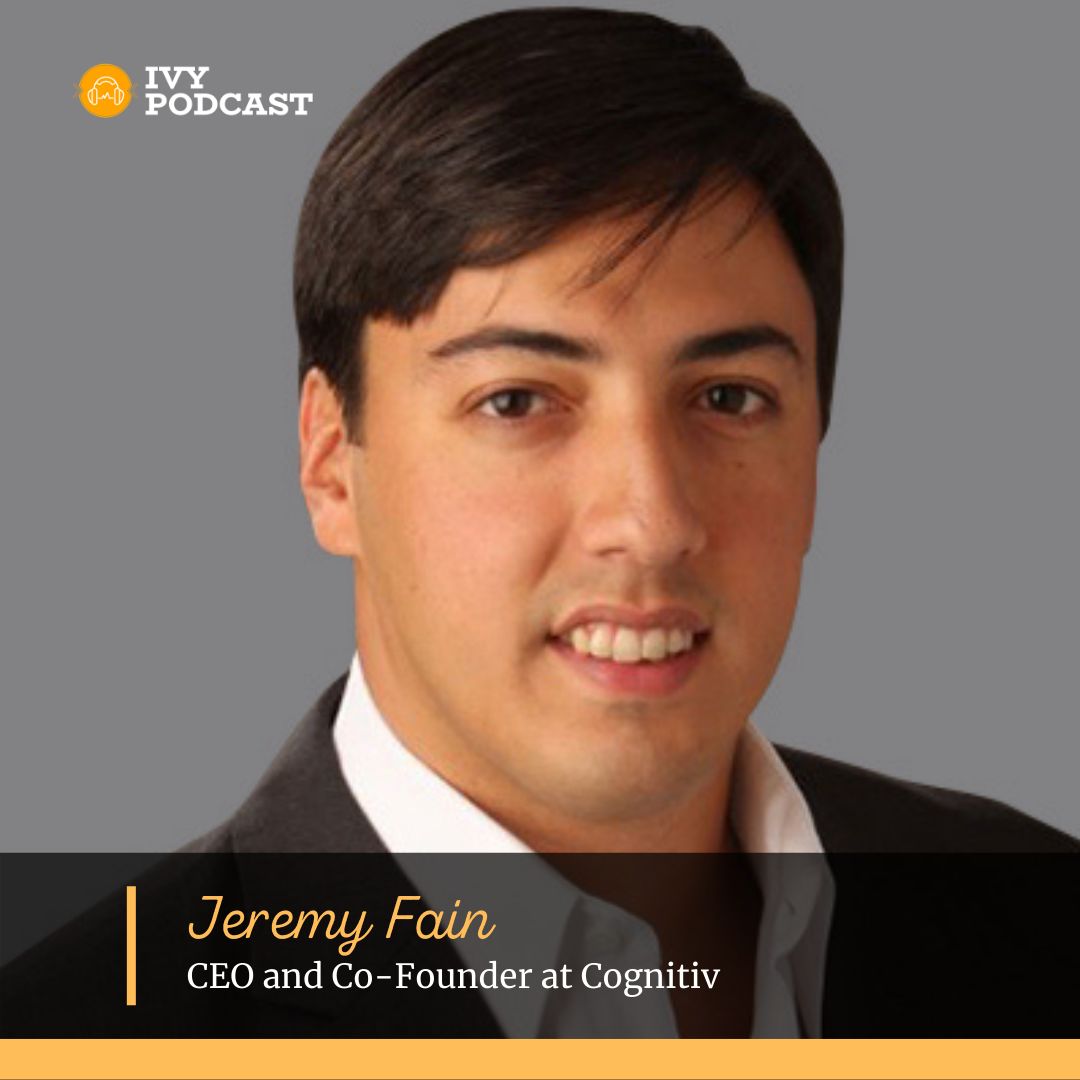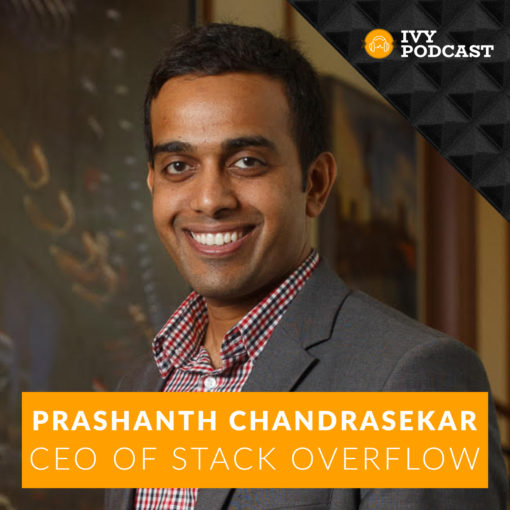
Jeremy Fain is the CEO and co-founder of Cognitiv, the first self-learning, fully automated neural network technology available for marketers.
With over 20 years of interactive experience across agency, publisher, and ad tech management, Jeremy led North American Accounts for Rubicon Project before founding Cognitiv.
Prior to Rubicon Project, Jeremy served as Director of Network Solutions for CBS Interactive. He also formerly served as Vice President of Industry Services for the IAB, where he shaped interactive industry policy, standards, and best practices.
Episode transcription:
F: Jeremy, I'm happy to have you with us here today. Thanks. J: Thanks for having me. F: Awesome. Tell us a little bit about yourself and what led you to co-found Cognitiv. J: Sure. So I've always been technical, I've always been interested in technology and business. I was a coder when I was younger. I grew up doing computer science in various magnet programs in Maryland and always wanted to work on the internet. When I was in high school, the internet became commercial. It came out commercially. And even before that, because I grew up in Maryland around the government, with, um, you know, IH, I did my internship at the army research labs. And my science program at high school was very connected to the government side of the Internet before it was commercial. And so really that was always my path. I was very excited about the worldwide web. When it came out, I was very excited about how it could be used, with images and texts. And now we can do so much more than we could back in the nineties. I always wanted to work in that business. So, after getting an electrical engineering degree at Yale, I went into business consulting, helping blue-chip companies learn how to use the internet and the worldwide web and other internet technologies such as email and having their own website and using the Internet to connect their systems together. I helped them do that for a while and continued on into marketing and digital and how to use websites and email and all the new pieces of the Internet for finding out more about your customers and how to communicate better with your customers and how to service your customers better. And so that naturally has evolved over my career into Cognitiv today. What we do is we use the newest technology out there, deep learning to predict consumer behavior, so we create algorithms for marketers to predict their customer's behavior, to predict consumer's behavior in a way that helps them become customers. And actually I started the company with two of my friends from growing up, Mark and Aaron. And so we went through the same magnet programs and science and engineering programs together all the way through high school. And we got back together to start this fund company about this new technology, deep learning. Great companies can achieve a competitive advantage by applying transformational approaches that power, their deep learning algorithms. F: What are some of the strategic recommendations you would advise organizations to take so that they can ensure effective application of deep learning techniques? J: Yeah, so deep learning and any kind of machine learning or artificial intelligence at this point requires a lot of data. Data requires a lot of labeled data. In fact, the first thing that we always recommend at Cognitiv is that a company really understands its data at a very discrete level. I mean, a lot of people are using off the shelf reporting platforms or even very expensive ERP platforms like SAP and Oracle, PeopleSoft, et cetera. And those are all customized to a certain extent, but in the end, a lot of those systems are aggregating data, throwing away the log file level data and using it only for reporting and analytics. But when you want to use the most advanced machine learning to predict patterns, to find patterns, to analyze the data itself, you have to have that discrete data and storage is not expensive at this point. You can do it in the cloud. You can own it, you can do all those things. So keeping data in its discreet raw form is probably the first thing that we tell most of the enterprise companies to do. Because you don't know if the data is useful, it may not be useful today in that form. But the way that the technologies are evolving so quickly, taking that data, transforming it into something that's useful for machine learning algorithms or deep learning algorithms. Those are actually two different things these days. It’s something that if you get rid of the data, you can never do, right? So, you want the data to be historic because deep learning algorithms and machine learning algorithms, they learn from the past to predict the future. So the more data you have, the more data you keep. It may be very valuable to you and useful, if you're not ready for it today. F:I have a follow-up to that explanation you just gave. So let's say you're an organization that's been, you know, expanding either organically or through acquisitions. And when you bring in this new company that you've acquired, they may have different sets of data structures. How does it affect your strategy? J: If your goal is to build one unified company, when you have the subsidiaries and other acquired companies, you know, housing data in different formats, then you need to have applications. Right? That's always a challenge like merging infrastructure between two companies, their own sort of database structures, the way that they look at data, et cetera. All I can say to that is that transformation managers should always push for more data. Right? So if you don't have enough of it coming in from or different data structures entirely from the acquisition or the merging companies should always, on the side of more data, never go, never decide that we're going to adopt a system that has less data or less discrete capability. So, you know, you have to start from scratch sometimes when you bring in a company with systems that hasn't had the same day as strategies you do, but you can always start from day one, with the additional data. F: Deep learning requires a lot of data gathering and extended period of time so that the data can be normalized in a way that they can understand the prediction, algorithms, algorithms that you're trying to, you know, put together, what time is the, you know, the most preferred point where you have enough data to a point where you can start making, you know, more or less accurate predictions based on the data that you have. J: That's a good question. So there's minimums and then there's ideals, right? So first of all, you know, something that I like us to talk about a little bit is the difference between older data science technologies, like decision trees and logistic regression and things like that versus deep learning. And I would say that it's a fundamental shift. So from a data scientist perspective, companies really need to think about bringing in deep learning, native data science experts versus trying to use the data science team that they have, that is used to a very different way of doing things. And the biggest difference we have, and this goes to your question about time and how much you need and things like that, the biggest difference is that data science experts that are deep learning experts spend almost all of their time on what we call feature engineering. Okay. So basically the variables that are input into an algorithm, into the question, could be, let's say time, let's say if it were talking about consumer data could be, How much does somebody make? What is their car, do they drive? Where do they live? How old are they? Then, you know, we have all this web data now. Like what apps do they use or what phone do they own or things like that. Right? So those are all inputs variables as you call them sometimes. Or we call them features right for algorithms. So engineering, those to be useful for deep learning algorithms, is an expertise in and of itself. Because the features that are used in logistic regression or decision trees are generally different than what we want them to be for deep learning, and so the formatting of the feature, how it looks, uh, how it's calculated, et cetera. So that's a number one thing that has to happen before. You can use all this data for deep learning algorithms effectively. There are a lot of data scientists out there that say we took our data. We put it into a deep learning algorithm and it wasn't as good as logistical regression or decision tree. Sometimes that's because you don't have enough data and decision trees and logistical regression can work a little bit better with less data. Most of the time in our experience it's because there hasn't been enough thought put into the feature engineering piece. Now, if you're feature engineering in a way that's really working for deep learning, the deep learning algorithms should by far outperform and out-predict logistic regression, decision trees, boosted forests, you know, things like that. So how much do you need? Okay. We at Cognitiv say a minimum signal that we need is a thousand signals in our line of work, which is in marketing. That would be a thousand conversions, a thousand people buying something, a thousand people doing something, but really you should try to have 10,000 signals. A hundred thousand sales, because if you took a look at a graph of effectiveness of let's say logistic regression versus deep learning, and the number of data points being used to train these algorithms and create these algorithms a thousand to 10,000 logistic regression and deep learning that they're both still learning and still getting better, but at about between 1,010 thousand, depending upon the algorithm, a logistic regression algorithm levels off. Because really what it is, it's a single layer, neural network, deep learning is what we call deep neural network, which has many layers of neurons and they learn differently and they learn with more data. And so the more data you get, the more effective and efficient a deep learning algorithm will become, whereas logistic regression and decision trees and various versions of those decision trees, peaks out. That's why it's okay to use those with you have not a lot of data, but if you have a lot of data and you really want to get to that next level of effectiveness and consumer prediction or any kind of prediction, really deep learning is by far and above the most advanced. And the last thing I'll say about that is you don't even need to take my word for it. All you have to do is look at before deep learning and after deep learning. Before deep learning, we couldn't talk to our phones, our televisions, our remote controls cars couldn't drive themselves. Computers couldn't see, so computers couldn't take a radiology x-ray and see a break in it, et cetera. So that's all deep learning, right? So before deep learning, we couldn't do any of those things. And then all of a sudden we could, and it was all because of deep learning. So clearly it's much more advanced than anything that we'd had before, because we've been trying to get, we've tried to talk to our computers for decades. I mean, naturally speaking, it was terrible for decades, but people, it was the best thing that we could do. And then all of a sudden we can pick up our phone no matter what we say, it basically understands us. F: That's an amazing thing. And desperately noticing, because deep learning is something that's starting to become more and more ubiquitous, even though people don't realize it. I'm curious to know from your perspective, Do you have any ethical considerations that maybe keep you up at night, something that people, the general public should worry about, as far as the planning is concerned? J: Yeah, that's a good question. I'll say this personally, I think we all have the anecdote where we've had a conversation about something. And then we see an ad about that come up on Facebook and Instagram. If that's something, one thing that I think people need to really understand is that if you have the settings and the privacy settings on your phone set to a certain extent, it's not that the phone itself is listening to you, but the apps that are alive, maybe listening to you and they can understand what you were saying now, you know, when you speak to an assistant on the phone, a recorded assistant on the phone, trying to get you to where you need to go. You don't have to say a single word. You can speak in full English sentences. Now that's all deep learning. So, you know, and when you walk around on the street, you know, one of the things, one of the problems that some investment agencies have with one of the big AI companies, Palentier that just went public is that they're helping the Chinese government with their CCTV surveillance capabilities because they're using a computer vision as part of the camera system. So people do need to understand that facial recognition, voice recognition, natural language processing is so advanced at this point as to be big Equitas, in a lot of ways. And they need to be, I think, aware of that. Do I think that 99.9% of the time these technologies are being used for non-nefarious, more commercial reasons that are anonymous and have nothing to do with who you or I are? Yes. But when you talk about privacy advocates, they're really worried about the government's ability to spy on us. And I think that's something that's very real and something that people should be thinking about. F: Good thing that you brought up the government, because that was going to be my follow-up to what you just said. Do you believe that deep learning is something that should be regulated by the government because of the, you know, bad things that can come out of it? Understandable that there are good things in this society that have emanated from deep learning, but there may be a few actors that may want to manipulate, therefore, you know, doing bad things. Do you think that this should be regulated by any government? J: Well, I think specific uses of deep learning will probably need to be regulated based on privacy requirements and laws. So that's one thing. But that shouldn't be for deep learning. It should be basically, you know, there should be a law that, you cannot be spied on without your permission, you know, and whether they're using deep learning or the next technology down the road or whatever, definitely there’re regulation, I think specific to deep learning needs to come in and does come in, Aand in fact is applied, is in terms of bias. Okay. So any algorithm has had, can be biased based on the data that is given to it and is used for training and one specific area where this could be problematic or even better than a human is in mortgage lending. Let's say fair, fair credit. You know, the fair, I'm going to get this wrong. Cause there's two of them. There's like the fair lending. And then there's the fair credit act or something like that. I'm sorry that I'm forgetting the exact language of those of those laws, but basically what they say is they require no race, gender and things like income, things like that to really be considered as part of whether you get approved for a loan or credit card or things like that. And It's heavily regulated, banks can't market using that data, credit card companies can't market using that data. But there are always these concerns about proxy features. Okay. So like zip code, right? So certain zip codes make more money than others. There's a code. Certain zip codes have more people of color or immigrants or whatever than other zip codes. And we know that, and that's all public access to the census. Right? So these things are also sort of in the gray area where most banks and credit cards aren't allowed to use location either as part of their inputs. Okay. Now some of them have simple algorithms that take all this information and spit out and approval because we've all applied for a credit card and gotten pre-forgotten approval right away or not, excuse me, but on the other side of that, humans have been biased for a long time and there's there's many, many instances of humans, discriminating against people, and trying to justify it in some way. Now people in the deep learning community or the algorithm and community would say, if we use all the data we're allowed to use to predict, to say yes or no to a mortgage, and we and the data are unbiased. Then the algorithm will be unbiased and it'll be fairer than a human at making decisions, which sounds great. I firmly believe that I'm an optimist about these things, but there is a concern and rightly so that the data will be biased, and will only further the discrimination that may be happening in certain places. So I think if it's done right, and if the regulations are written in a way that makes sure that the data is unbiased, that goes into these algorithms, then deep learning can actually help, versus hinder things like fair credit and equal opportunity, to loans and things like that. F: I actually have a lot more questions regarding regulation and how let's say GDPR versus how the laws are applied in the States or any other country. But maybe we can leave that for another day because I have a few of the questions that I want to cover. J: Sure. I can talk about those all day long. F: You talked about big data earlier, and the importance of that in your experience. Working with large media companies and advertising agencies, how has big data helped such businesses generate the most impact on their goals and financial results? Any case studies you can share with us? J: Well, we're not really allowed to go into specifics of our clients, but I'll say this. Companies that have a handle on their big data capability are winning. Okay. And in marketing and advertising, the biggest problem that I would say marketers have right now is that they use a lot of other tech platforms.They use a lot of third-party vendors that do different marketing functions for them. And then that data stays inside that marketing vendor and it's disconnected. That's why I think you see a lot of talk about CDPs, these customer data platforms, because marketers are being told now that they need to take all that vendor data and bring it back together and synthesize it in a single data warehouse, which is a good thing. It absolutely is. The reality of it is there's still grades of what people are doing. A lot of them are bringing in aggregated data. And storing it, but really what everybody needs to do is get the log level, the discrete actions, like everything that happens on our website should be logged like everywhere. Somebody goes on your website should be logged on that sort of click path. Logged, right? It's not, Hey, this person came to my site and looked at five pages. It's which five pages, in which order did they come. Because if that leads to a sale or a conversion, then a deep learning algorithm can see that click through pattern and watch other people do exactly that or something like that. Or go to pages like those pages in that click. And predict that these people are like that other person, and we think they're going to move to a sale. So we're going to treat them differently or retarget them differently or advertise to them differently. So all that discrete data and that complex pattern of consumer behavior is the key for all marketers. And I would say that very few marketers are taking full advantage of that information right now, agencies are not helping them do that. Uh, most third parties are not able to do that. And so I think we're still sort of in the Wild West of the big data capability for marketers, even though I think they think they have tons of data. Is it usable data? That's the bigger question. F: Great. So my background is in project management and I'd like to know how does project management play a role in the way you've developed your big data stack? J: Well, everything needs good project management, right? You know, look, technology companies, in my opinion, live or die by project management. It's hitting deadlines. It's mapping out the processes that you need to get from A to Z and everything in the middle. So having a good project management capability is really important. So like for my company and for most companies in our space, when we think of a product, a lot of the time we're calling product managers, what they were calling, we call people product managers, but they're really project managers, right? It's like, all right, we have an idea for a new product or a new way to use our technology. Okay. We need to launch it in three months. The product manager is required to get that done. So having a very good project management knowledge, it is important. You know, I've worked in a lot of different companies. The bigger companies have a project manager discipline, where you assign a project manager to a product like actually in the agency I worked in years ago, the team was made up of a marketing expert, a technology expert, and a project manager. And that was one of the first companies I ever had a very specific project management expertise. And that project manager was the one that was supposed to get us on our deadlines, keep us going. And that was very important because they were client driven deadlines and we had to get their consultancies. Of course, you know, I've worked for Pricewaterhouse Coopers, and that was important, but I think, you know, companies like tech companies, other companies that are not consultancies or service organizations, should really think about having project management as a specialty, especially when it's attached to product development. F: RPA, AI, ML and other advanced technologies, such as deep learning are reinventing software engineering as a whole. How do you think these trends will impact your industry from an innovation stempoint? And what are your thoughts on the best strategies to adopt such technologies? J: Yeah. So I've been programming since early nineties. And I liked the machine learning and deep learning and that kind of software development of that era. Now, if you want to be a coder for, like, a front end app or something like that, you don't even really need to know how to code. I mean, it's all the libraries and plug and play and drag and drop, and you can basically create an app without knowing much. All right. But back in the nineties, you had to code every single line. There weren't any libraries. There weren't any shared procedures and all these other things. ML is moving quickly towards having better libraries. And it's a lot of open source, but you're still really trying to figure out things, especially with ML, it's pretty expensive to do deep learning. It has to run on GPU's. Okay. And renting GPU is very expensive compared to a CPU, but a GPU is at least 10 times faster than a CPU. Now that sounds pretty good. It's not a hundred times, but think about it this way. If I have big data, then it's going to take me a long time to go through that data, use it to train an algorithm. It could take a day. On a GPU, it takes a day on a GPU, it takes 10 days on a CPU. Okay. So, the library only gets you so far, right? We do a lot of C++. Okay. So another thing about, I would say ML engineers or software engineers are doing deep learning C++ or very, very fundamental sort of programming language versus C-sharp or Java, I mean, things like that you'll never get anything done. I think in those, speed is king. And that's when I grew up coding, that was how we learned to code. It had to be super efficient, and in the end, depending upon the computer you're using, you can even tweak it more for the processors. A lot of what we do is that still we're tweaking it for different processors. You know, now Amazon's coming out with a whole new set of GPU and CPU and the CPUs have a different fundamental architecture that we need to have some different libraries, use it and tweak it a little bit for speed. But if we do, we could do it 40% faster. You know, those are the kinds of things that we talk about more in ML and, and deep learning. And I would say that not a lot of coding is done at that level anymore. A lot of coding is very front-end. So the short answer is finding C++ programmers. And those things are hard, but if you want, as an engineer, and you're coming up and you want to be a part of this big day, this sort of new thing, you really need to be very fundamental, which means doing it as C++ level or something like that. And it should all be about speed. Yeah, here at process it, I oversee the IT recruitment division for some of the advanced technical roles, such as site, reliability, engineers, and deep learning engineers. F: In your role as CEO, do you tend to get creative with your interview questions? And what do you typically look for in the candidates that you interview? J: So going back to my first answer, which is I started this company with two of my friends growing up. I am the CEO. I was a coder. I was not the best coder compared to Mark and Aaron. They were both much better than I am. But I'll say this, we came up through a very rigid and old school computer science. Education system, right? Algorithms and data structure, software engineering, one software engineering, again, learning how to code efficiently and correctly, you know what the difference between the sorts are things like that. So the way that we recruit is we're very fundamental about our recruiting. You have to be a computer scientist, you don't have to have a computer science degree, but you really have to understand the very discreet and fundamental building blocks of how to be an efficient coder. Right? So for us, and I can't say that I am a part of the interview process anymore as we've grown, I just haven't been able to do that. But when we started the company, you know, the interview process was pretty straightforward. We asked some very mental computer science questions, like How would you sort 10 million files in a system or, you know, things like that. But they'd have to be able to answer it on the spot and then we would also give them coding exercises. So they had to be interviewed by a large number of our senior developers. So it's a lot like what we've heard Microsoft used to be. We know Microsoft used to be that way. We don't know how it is now, you know, and when you need 10,000 coders, you can't necessarily go through that kind of a process. But for us, one really good developer is worth five. So we really try to give them hard questions that they have to be able to either answer on the spot or within a week of a coding exercise, that really shows and can showcase what they do at a fundamental coding level. F: Last question, and I normally ask this to all my guests. What has helped you get to where you are today and what advice would you give to someone that wants to pursue a career that's similar to yours? J: I would say that one of my strengths is that I do have the coding background. I have the engineering and the coding background, and it helps me at least talk the talk, even though I can't walk the walk anymore, but again, like I said, I think for me, because I went through a very old school, strict regimented computer science education. It's how I think, you know, I'm an engineer at heart because of that. You know, when you learn how to do computer programming, you are problem solving. You're trying to figure out the most efficient and fast way to route a plane from A to B or a train, or do these optimization problems using computers. And it's an amazing thing, and it's just exciting to solve these problems, but that also trains your mind to be a problem solver. And I think that helps anybody in any career. How do you handle a problem? How do you handle a challenge? How do you break it down? What's the fundamental problem versus the causal problems? And I think that has helped me the most in my career, you know, as I graduated as an engineer, as an electrical engineer, but then spent time in business, went back to school at Columbia Business School. All of those things made life easier for me, how I approach every challenge, every problem. How do I map the product vision of the company from A to B? How do I understand whether something's a big problem or a little problem? You know, all those things come from learning, computer science and thinking like an engineer. F: Thank you for joining us on the show and sharing your insights with us, Jeremy, I'm looking forward to catching up with you in the near future. J: Thank you very much for having me. This has been great. I hope you, uh, have a good holiday. Thanks. F: Happy Thanksgiving to you as well. We hope you've enjoyed this episode of the podcast. Please take a moment to rate, review and subscribe on your preferred podcast listening platform. We really appreciate that effort until next time.













